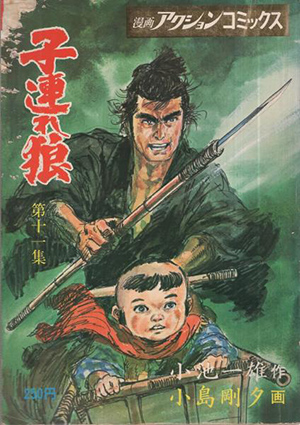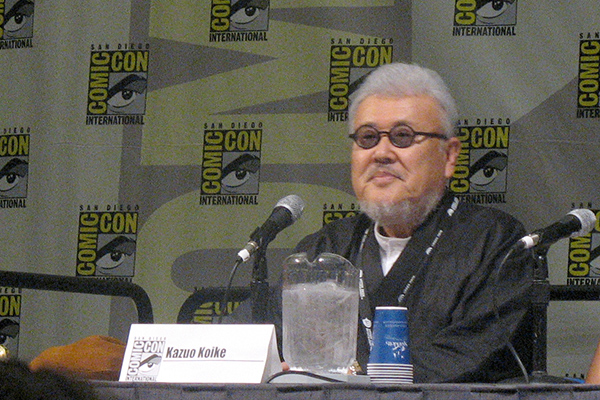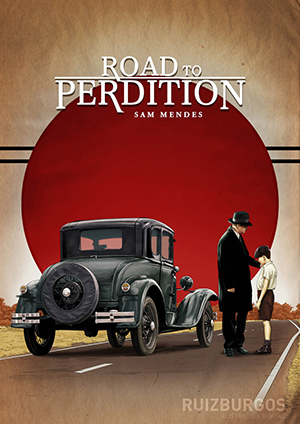
Kazuo Koike, the great creator of the manga classic, Lone Wolf and Cub, has died at age 82.
My name appears in many of his obits, along with Frank Miller and Quentin Tarantino, because of the influence he had on our individual work. Road to Perdition is often mentioned, of course, sometimes stating that it was an American version of Lone Wolf and Cub.
My interactions with this incredible writer were decidedly odd.
At one point, I received a very friendly e-mail from an associate of his saying Kazuo Koike would be in America soon and was an admirer of my work, and wanted to meet. This was perhaps a year after Road to Perdition, the film, came out. The meeting would have been in Los Angeles, if I recall, and I had to explain that I lived in Iowa, nowhere near L.A. I said I would have loved to meet with him, and that I was a great admirer of his work.
Then at the 2006 San Diego Comic Con, I attended a panel that was just Koike and a translator and someone from Dark Horse, his American publisher. During the question-and-answer session, Koike complained that his work had been plundered, and mentioned Road to Perdition as an example, complaining that these plunderers might at least have given him credit.
Afterward, I went up with my son Nate and caught Koike before he’d left the stage, and Nate startled the great man somewhat by introducing me in Japanese. (As many readers of these updates know, Nate is a translator of Japanese into English and has done novels, manga and video games.) Nate told him that I was a big fan and meant to pay homage to him, and would like to shake his hand. He shook my hand, and signed a book for Nate.

Kazuo Koike, SDCC 2006
A few years later, at another San Diego con, Koike was appearing again, and (Nate again with me) I approached the Dark Horse people about arranging a brief meeting between us. They checked with him. I was told he did not want to meet with me.
Lots of peculiarity here. First, why had I been approached for a friendly meeting earlier? Would it have been an ambush of some kind? Also, I have always gone out of my way to acknowledge Lone Wolf and Cub as one of the inspirations for Road to Perdition. Koike quotes serve as epigrams at the start of the graphic novel and the two prose sequels.
If anything, I have – and certainly others have – exaggerated Road’s debt to Lone Wolf. As I’ve mentioned in any of number of places, I was most of all drawing upon John Woo movies, including Heroes Shed No Tears (1986), a very overt (wholly uncredited) updating of Lone Wolf and Cub. In the ‘80s, I was watching a lot of Hong Kong crime movies, gray market VHS copies, when director/writer Woo was fairly unknown in America. I saw Heroes Shed No Tears before I saw any of the Lone Wolf movies.
Further, in Road, I was drawing upon the real-life Rock Island gangster, John Looney, and his homicidal son Connor, and the falling out that several formerly loyal lieutenants had with Looney. In a more basic way, I was combining the movies about ‘30s bank robbers (Bonnie and Clyde, Gun Crazy) with gangster films (St. Valentine’s Day Massacre, Godfather). The notion was to bring the worlds of the rural outlaws and urban gangsters of the ‘30s together. And I’d already been doing Nate Heller for some time (Looney and son are mentioned in True Detective, 1983).
No question that Lone Wolf was in the mix. I specifically thought that the shogun and his assassin had parallels in a mob godfather and his chief enforcer. And the father and son seeking vengeance while they were being chased was an element, too, although my anti-hero’s son was an adolescent, not a baby in a cart. Robbing banks where the mob cached their cash came from the terrific Don Siegel-directed film, Charley Varrick (1973), and striking back at the mob for vengeance through their bank books was from John Boorman’s Point Blank (1967). The latter was also the start of what became my Nolan series
A lot of what I do draws from popular culture I like, but with a twist. Quarry has some of its roots in another Siegel film, The Killers (1964). Mommy is The Bad Seed flipped. Nate Heller is Philip Marlowe/Mike Hammer thrust into real unsolved crimes of the Twentieth Century. Girl Most Likely, to some degree, transposes the Nordic noir to the USA.
Lone Wolf did inspire the saga-like structure I originally had in mind. The idea was to have Michael O’Sullivan and his son on the road for 900 pages (in 100-page increments). But Road to Perdition (1998) was published as a single graphic novel (and not three 100-page “issues”) when Paradox Press (DC’s noir graphic novel line) went bust. After the film came out, I was able to go back to do another 300 pages of the father and son on the run (Road to Perdition 2: On the Road). The rest of the story was told in two prose novels – available from Brash Books – Road to Purgatory and Road to Paradise, and another graphic novel from DC, Return to Perdition.
My debt to Kazuo Koike is undeniable, if perhaps not as great as he imagined. What is great is his body of work, and his masterpiece, Lone Wolf and Cub. He might wince to know I turn up so often in his obits, but I am nonetheless honored to be in his company.
Another of my favorite manga creators, Monkey Punch (Kazuhiko Kato), also died recently, at 81. His Lupin III is a classic, and inspired perhaps the greatest anime, Cowboy Bebop. If you’ve never seen Monkey Punch’s thief in action, seek out the feature length Lupin III: The Castle of Cagliostro (1997), directed by the genius animator, Hayao Miyazaki.
Check out this write-up about Kazuo Koike’s passing.
Here’s a top-notch review of Girl Most Likely from Criminal Element.
Here’s a short but sweet Girl Most Likely review.
Another decent Girl review can be seen here.
And this may be my favorite review of Girl Most Likely yet.
M.A.C.
Tags: Girl Most Likely, Nathan Heller, Passings, Reviews, Road to Perdition, True Detective

Al,
I’m sorry that Koike felt that way. Perhaps it was his age. Your “Perdition” books were certainly original. The idea of a father-son team is not new. Just look at the Maccabees. I sure others can come up with other examples.
Be Well and My Best to Barb,
Gary